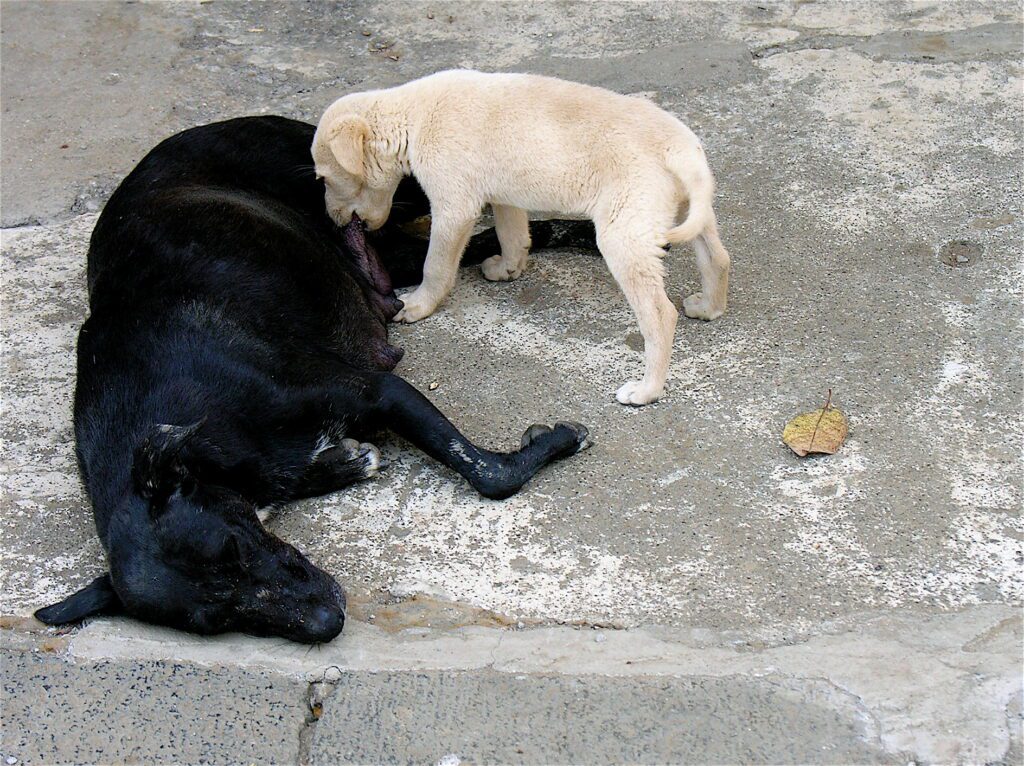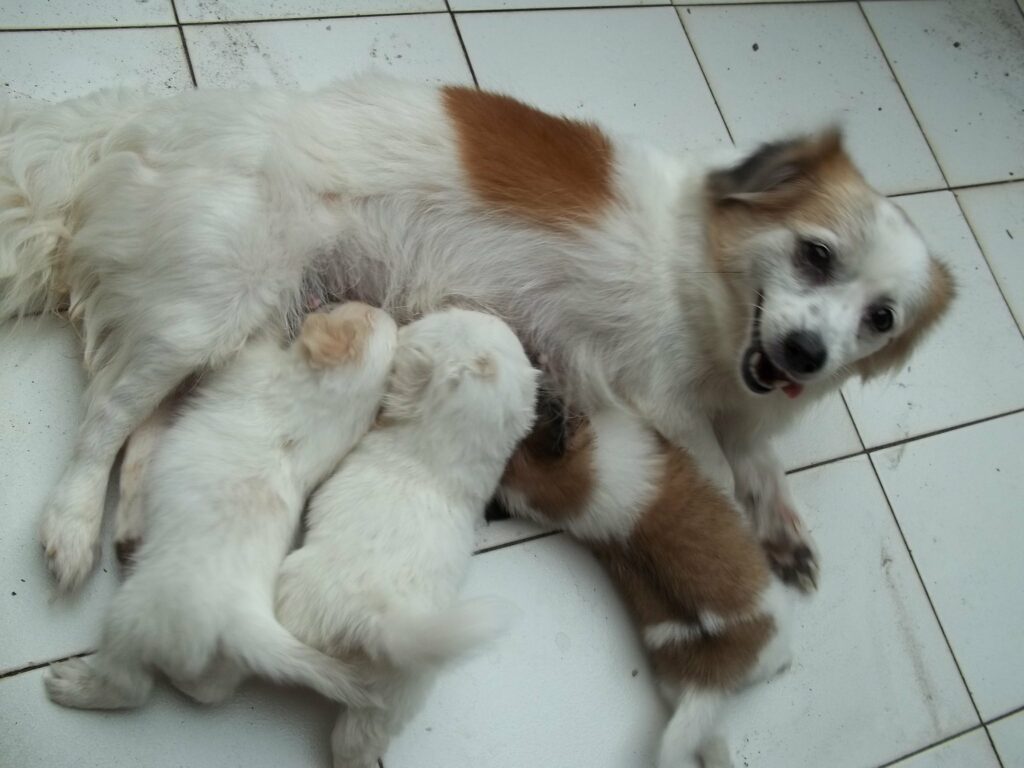Welcoming a litter of adorable puppies into the world is an exciting time, and ensuring their healthy growth starts with the mother dog’s diet.
A proper nutrition plan during nursing is essential for her well-being and the puppy’s development.
Discover the key ingredients and guidelines to keep a mother dog nourished and her pups thriving.
Key Takeaway
| Key Takeaway |
|---|
| – A nursing mother dog’s diet should include high-quality puppy food, lean protein sources, eggs, cottage cheese or yogurt, vegetables, whole grains, and fatty acids. |
| – Foods to avoid for a nursing mother dog include chocolate, caffeine, alcohol, grapes and raisins, onions and garlic, avocado, macadamia nuts, xylitol, raw or undercooked meat and eggs, and high-fat foods. |
| – Feeding guidelines for a nursing mother dog include increasing caloric intake, feeding high-quality dog food, providing sufficient water, dividing meals into multiple feedings, monitoring body condition, avoiding excessive weight gain, implementing a gradual weaning process, and scheduling regular veterinary check-ups. |
| – Proper nutrition is essential for the mother dog’s health and the healthy development of her puppies. Consult with a veterinarian for specific dietary guidelines and individualized care for the nursing mother dog. |
What Should a Mother Dog’s Diet Be When Nursing Puppies?

When a mother dog is nursing puppies, it is crucial to provide her with a well-balanced diet that supports her nutritional needs and ensures the production of high-quality milk.
Here is a list of foods that are beneficial for a mother dog’s diet during the nursing period:
1. High-Quality Puppy Food
High-quality puppy food is specifically formulated to meet the nutritional needs of nursing or lactating dogs.
It contains higher levels of protein, which is essential for milk production and tissue repair. It also provides the necessary calories to support the increased energy requirements of a nursing mother dog.
See also: How To Care For a Newborn Litter of Puppies [Complete Guide]
2. Lean Protein Sources
Lean protein sources like cooked chicken, turkey, beef, or fish are important components of a nursing mother dog’s diet.
Protein is crucial for the growth and development of the puppies and helps the mother maintain muscle mass and repair tissues. It provides essential amino acids necessary for the production of high-quality milk.
3. Eggs
Eggs are a nutritious addition to a mother dog’s diet during nursing.
They are rich in protein and contain essential fatty acids, which support the overall health of the mother and contribute to the quality of the milk.
Eggs can be boiled or scrambled and fed to the mother dog as a source of additional nutrients.
4. Cottage Cheese or Yogurt
Cottage cheese and yogurt are dairy products that can provide calcium and protein to a nursing mother dog.
Calcium is important for the development and maintenance of strong bones in both the mother and the growing puppies. These dairy products also offer probiotics that support a healthy digestive system.
5. Vegetables
Cooked or steamed vegetables such as carrots, peas, and green beans are beneficial for a nursing mother dog.
They are rich in vitamins, minerals, and fiber, which contribute to the overall nutritional balance of her diet. Vegetables also add variety and texture to the diet, making it more appealing for the mother.
6. Whole Grains
Whole grains like brown rice or oatmeal are a good source of energy and fiber for a nursing mother dog. They provide carbohydrates for sustained energy and help maintain healthy digestion.
Including whole grains in the diet can also contribute to a feeling of fullness and satisfaction for the mother.
7. Fatty Acids
Sources of essential fatty acids, such as fish oil or flaxseed oil, are important for a nursing mother dog.
These fatty acids, including omega-3 and omega-6, support the mother’s overall health, promote a healthy coat and skin, and aid in the development of the puppies’ nervous systems.
They also have anti-inflammatory properties.
Foods That a Nursing Mother Dog Needs To Avoid

Chocolate
Chocolate contains theobromine, a stimulant that affects the central nervous system and cardiovascular system of dogs.
It can be toxic to dogs, leading to symptoms like increased heart rate, tremors, seizures, and even death. Nursing mother dogs should avoid all forms of chocolate, including dark chocolate, milk chocolate, and cocoa powder.
Caffeine
Beverages like coffee, tea, and energy drinks that contain caffeine should be avoided by nursing mother dogs. Caffeine is a stimulant that can have similar effects as chocolate.
It can cause increased heart rate, restlessness, tremors, and even caffeine toxicity. Consumption of caffeine can also pass its effects to nursing puppies.
Alcohol
Alcohol is extremely toxic to dogs, and even a small amount can have severe consequences. It affects the central nervous system, leading to symptoms such as disorientation, lack of coordination, vomiting, seizures, and even respiratory failure.
Nursing mother dogs should never be given any alcoholic beverages or foods cooked with alcohol.
Grapes and Raisins
Grapes and raisins can be highly toxic to dogs, causing kidney damage and potentially leading to kidney failure.
The exact toxic substance in grapes and raisins is not known, and some dogs may be more sensitive than others. It is best to avoid giving grapes and raisins to nursing mother dogs to ensure the safety and well-being of the puppies.
Onions and Garlic
Onions and garlic, both in raw and cooked forms, contain compounds that can damage a dog’s red blood cells, leading to a condition called hemolytic anemia.
This can result in weakness, pale gums, and lethargy. Nursing mother dogs should avoid all forms of onions and garlic, including powdered, raw, cooked, or processed foods.
Avocado
Avocado contains a substance called persin, which is toxic to dogs when consumed in large quantities.
While small amounts of avocado flesh are not likely to be harmful, it is recommended to avoid feeding avocados to nursing mother dogs.
In some cases, ingestion of avocado can cause gastrointestinal upset, including vomiting and diarrhea.
Macadamia Nuts
Macadamia nuts are toxic to dogs and can cause symptoms such as weakness, tremors, vomiting, and an increased body temperature.
Nursing mother dogs should be kept away from macadamia nuts and foods that contain them. It is important to note that even a small amount of macadamia nuts can be harmful to dogs.
Xylitol
Xylitol is an artificial sweetener commonly found in sugar-free products such as gum, candy, and baked goods. It is highly toxic to dogs and can cause a rapid release of insulin, leading to dangerously low blood sugar levels (hypoglycemia).
Signs of xylitol poisoning include weakness, lethargy, vomiting, seizures, and even liver failure. Nursing mother dogs should be kept away from all products containing xylitol.
Raw or Undercooked Meat and Eggs
Raw or undercooked meat and eggs may contain harmful bacteria like Salmonella or E. coli, which can cause digestive upset and even serious infections in dogs.
It is essential to ensure that all meat and eggs are cooked thoroughly before feeding them to a nursing mother dog to minimize the risk of bacterial contamination.
High-Fat Foods
Foods that are high in fat, such as fatty meats, fried foods, and greasy snacks, can be difficult for dogs to digest. High-fat foods can lead to gastrointestinal issues such as pancreatitis, which is inflammation of the pancreas.
Nursing mother dogs should be fed a balanced and easily digestible diet to avoid any unnecessary stress on their digestive system.
Avoiding these foods is crucial to safeguard the health and well-being of the nursing mother dog and her puppies. It’s always recommended to consult with a veterinarian for specific dietary guidelines and to address any concerns regarding the mother dog’s nutrition.
Feeding Guidelines for a Nursing Mother Dog
1. Increase Caloric Intake
- A nursing mother’s dog requires more calories to meet her increased energy demands.
- Consult with a veterinarian to determine the appropriate caloric intake based on the dog’s size, breed, and the number of puppies she is nursing.
- Generally, the calorie requirement may increase by 25% to 50% during lactation.
2. Feed High-Quality Dog Food
Choose a high-quality dog food that is specifically formulated for nursing mothers.
Look for a product that contains balanced nutrition, including adequate levels of protein, fat, vitamins, and minerals. Avoid dog foods with fillers or low-quality ingredients.
3. Provide Sufficient Water
Ensure the nursing mother dog has access to clean and fresh water at all times.
The production of milk requires hydration, so make sure she has plenty of water available to meet her increased fluid needs.
4. Divide Meals into Multiple Feedings
Instead of offering one or two large meals, divide the mother dog’s daily food allowance into multiple smaller meals throughout the day.
This approach helps prevent overeating and digestive issues, and it ensures a steady supply of nutrients for both the mother dog and the puppies.
5. Monitor Body Condition
Regularly assess the mother dog’s body condition by observing her weight, overall appearance, and energy levels.
Adjust her food intake if necessary to maintain a healthy body condition. Consult with a veterinarian for guidance on monitoring her weight and body condition.
6. Avoid Excessive Weight Gain
While it is important to provide adequate nutrition, avoid overfeeding the mother dog, as excessive weight gain can lead to health complications.
Follow the feeding guidelines recommended by your veterinarian and monitor her weight to ensure it remains within a healthy range.
7. Gradual Weaning Process
As the puppies grow, gradually introduce them to solid food and start the weaning process. Consult with a veterinarian for guidance on the appropriate timing and techniques for weaning the puppies from their mother’s milk.
This process allows the mother dog’s milk production to decrease gradually while the puppies transition to solid food.
8. Regular Veterinary Check-ups
Schedule regular veterinary check-ups for the mother dog to monitor her health, body condition, and the development of the puppies.
The veterinarian can provide tailored advice on feeding, nutritional supplements, and any specific care requirements based on the mother dog’s individual needs and the progress of the puppies.
Following these feeding guidelines and seeking veterinary guidance will help ensure that the nursing mother dog receives proper nutrition to support her health and the healthy development of her puppies.
In Conclusion
In conclusion, providing a well-balanced and nutritionally appropriate diet is crucial for a nursing mother’s dog’s health and the growth of her puppies.
Increasing her caloric intake, choosing high-quality dog food, and following feeding guidelines recommended by a veterinarian is key to supporting her nutritional needs during this critical period.
By prioritizing her diet, we can ensure the well-being of both the mother dog and her precious pups.





Leave a Reply